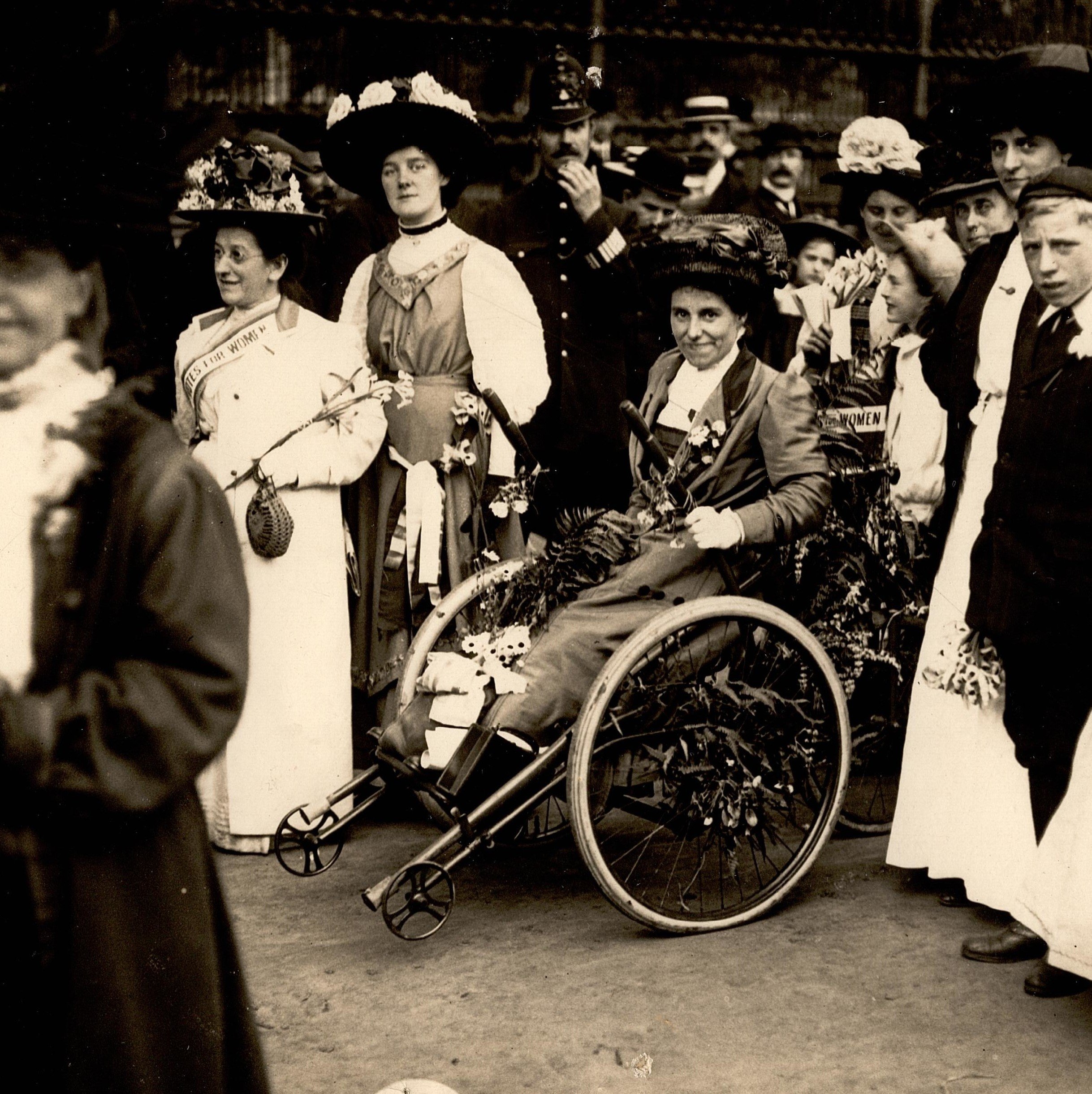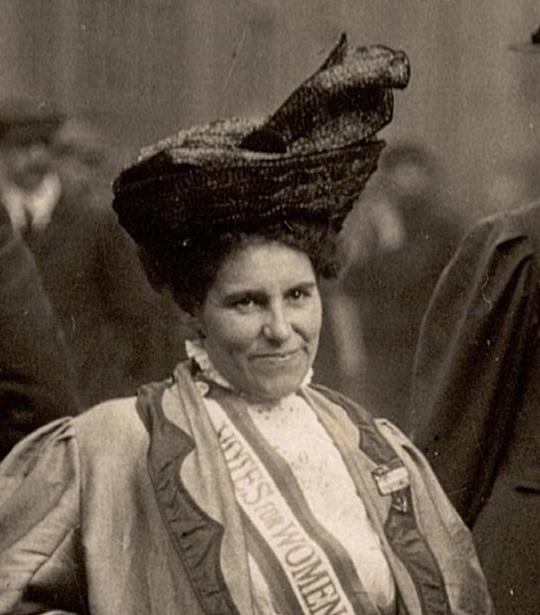Lewisham’s famous women: Rosa May Billinghurst ( 1875 – 1953)
Rosa May Billinghurst (commonly known as May Billinghurst) was born on 31 May 1875 at 35 Granville Park, Lewisham. She was the second of nine children. Her father, Henry Billinghurst, was a banker. Her mother, Rosa Brinsmead, was the daughter of a wealthy piano manufacturer.
May was born healthy but at the age of five months, she suffered an illness (possibly polio) which left her disabled with paralysis from the waist down. After that, her legs were strapped in irons and she relied on the use of an invalid tricycle for mobility.

The Billinghurst family paid for a governess to provide her with a good basic education. May’s disability and gender limited her options in life. At 25 years old, she was the only one amongst her siblings who hadn’t managed to flee the family nest.
Activism
Her sister, Alice Billinghurst, who was a superintendent at a local children’s home, arranged for her to do voluntary work for the Greenwich and Deptford Union Workhouse. She also joined one of her sisters in the work of rescuing young girls from prostitution in Greater London. It was the injustices she encountered while engaged in this work that shaped her political beliefs and led her to join the fight for women’s suffrage.
She was shocked by what she saw and later recalled:
My heart ached and I thought surely if women were consulted in the management of the state happier and better conditions must exist for hard-working sweated lives such as these.
It was gradually unfolded to me that the unequal laws which made women appear interior to men were the main cause of these evils. I found that the man-made laws of marriage, parentage and divorce placed women in every way in a condition of slavery – and were as harmful to men by giving them power to be tyrants.”
She attended meetings where she heard Millicent Fawcett, Charlotte Despard and Emmeline Pankhurst give speeches. However, it was Christabel Pankhurst who inspired her to become a suffragette:
“I wondered how the public could ever be made to think about it. In the midst of the hopelessness of it all Christabel Pankhurst sounded the war note of militancy and was imprisoned for her boldness, and the subject of votes for women was on every tongue.”
She had been a member of the Women’s Liberal Association but resigned to join the newly formed Lewisham branch of the militant Women’s Social and Political Union (WSPU) in October 1907. Over the next few months, her family donated a considerable sum of money to the organisation.
Arrested
May Billinghurst was one of the many workers who kept the local branches of the Women’s Social and Political Union running from day to day. Her duties ranged from organising bazaars and acting as an assistant in the local WSPU shop to ensuring a good turnout for all-important national demonstrations.
She was arrested and imprisoned more than once and used her popularity with the press, who liked to picture her sentimentally as one of life’s victims, to draw attention to the Cause. She was known to the press and her comrades as “The Cripple Suffragette”.
Fran Abrams, the author of Freedom’s Cause: Lives of the Suffragettes (2003) argues that May Billinghurst became an important figure in the WSPU campaign. She writes:
May Billinghurst was no fool. She knew full well, and so did the leaders of the WSPU, that her hand-propelled invalid tricycle gave her a special advantage in the propaganda battle they were waging. It made it difficult, if not impossible, for the media to portray May as a howling harridan with little care for the safety of others. At its least effective the sight of her at a demonstration was a picturesque one, commented on lightly along with other aspects of the pageantry of the day. At best, it served to underline in bold the brutal tactics of the police and the vulnerability of the suffragette demonstrators.”
Although police officers claimed that they tried to wheel May Billinghurst out of danger whenever there was violence on the streets, she viewed things differently. She described being dangerously manhandled during a suffragette protest outside the House of Commons in 1910, where she was one of 159 women arrested.
Afterwards, she recalled:
“At first the police threw me out of the machine on to the ground in a very brutal manner. Secondly when on the machine again they tried to push me along with my arms twisted behind me in a very painful position. Thirdly they took me down a side road and left me in the middle of a hooligan crowd, first taking all the valves out of the wheels and pocketing them so that I could not move the machine.”
Smashing windows
Between 1910 and 1912, Parliament considered various bills to give some women the vote but ultimately, none of them passed. In response, the WSPU organised a window smashing campaign in March of 1912, which led to 220 arrests. The campaign was focused on the West End of London and ‘on 1 March, 150 women were given hammers, told exactly when to strike and how to avoid falling glass.

As part of the campaign, May smashed a window on Henrietta Street. She was sentenced on 12 of March to one month’s imprisonment.
The window smashing campaign and subsequent arrests were reported widely in the press. Many, but not all, of the women involved are mentioned by name within the newspaper cuttings kept by the Home Office, although May is not. Her disability, however, is noted.
In a clipping from The Times dated 13 March 1912, they report:
A cripple who had broken a window in Henrietta Street refused to enter into recognizances and was sentenced to one month’s imprisonment.”
On her release, she took part in the campaign to destroy the contents of pillar boxes. By December 1912, the government claimed that over 5,000 letters had been damaged by the WSPU.
May Billinghurst was eventually arrested at Blackheath, preparing for a pillar box raid. She seemed pleased about being caught as she told the police officer: “With all the pillar boxes we’ve done, there has been nothing in the papers about it – perhaps now there has been an arrest there will be something.” May appeared at the Old Bailey in January 1913 and was sentenced to eight months imprisonment.
Imprisoned and force fed
On starting her sentence in Holloway prison on 9 January 1913, she immediately went on hunger strike. Against the medical opinion of her own doctor, despite her infirmities, and against her will, the prison authorities attempted forcibly to feed her several times. One attempt to gag open her mouth was so violent that her teeth were damaged, and her cheek gashed open.
After protests about her treatment by George Lansbury and Keir Hardie in the House of Commons and comments from the prison doctor, who feared she would die of a heart attack, she was released on 18 January after serving only ten days.
After her release, she campaigned to stop the forcible feeding of suffragette prisoners and continued to battle for the vote.
On 21st May 1914, May Billinghurst took part in a WSPU demonstration outside Buckingham Palace. This eventually turned into a battle between the suffragettes and 1,500 policemen.
England at war
On 4 August 1914, England declared war on Germany. The leadership of the WSPU began negotiating with the British government. On 10 August, the government announced it was releasing all suffragettes from prison. In return, the WSPU agreed to end their militant activities and help the war effort.
With the onset of war, May Billinghurst left Lewisham and went to live with her artist brother Henry Billinghurst in Regent’s Park village. Her commitment to feminist societies continued throughout her life: she was a member of the Suffrage Fellowship and the Women’s Freedom League.
May stopped her activity for women’s suffrage after the Parliament (Qualification of Women) Act 1918 gave some women the vote.
May Billinghurst died on 29 July 1953 in St Mary’s Hospital, Twickenham, from heart failure while recovering from pneumonia. Her unrelenting commitment to the welfare of women and her belief in reincarnation led her to leave her body to the London School of Medicine for Women.
Sources
Freedom’s Cause: Lives of the Suffragettes (2003)
Oxford Dictionary of National Biography
Spartacus Educational
Hearts and Minds: The Untold Story of the Great Pilgrimage and How Women Won the Vote
Rosa May Billinghurst: suffragette, campaigner,’ cripple’
Continue your women’s suffrage research at The National Archives





